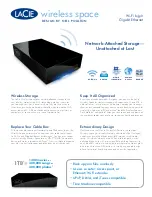
Chapter 3
Subsystem Connection
This chapter outlines some general configuration rules you should
use when configuring a storage system and introduces basic
information about Fibre optical cables and Fibre Channel topologies
for the subsystem. You can refer to these topologies or use them as
a guide for developing your own unique topologies. A complete
description of the power on and power off procedures is also given in
this chapter.
3.1
FC Host Connection Prerequisites
3.1.1 Choosing
the
Fibre
Cables
The Fibre Channel standard allows for both copper and optical
connections. Copper cable is cheaper but limited to lengths of less
than 30m (33 yards). Optical cables can be used over longer
distances and have been shown to be more reliable. Due to the
demands of high transfer rates, optical cables are preferred for
4Gbps fiber connectivity. Optical cables are also less susceptible to
EMI (Electromagnetic Interference).
Fibre cables are components that need to be purchased separately.
You may order Fibre cables of different lengths from your subsystem
vendor. These transceiver and cables have been tested and proven
compatible with your subsystems.
IFT-9270CFCCab01
Optical FC cable, LC-LC, MM-62.5/125, Duplex, LSZH,
O.D.=1.8mmx2, 1 Meter
IFT-9270CFCCab02
Optical FC cable, LC-LC, MM-62.5/125, Duplex, LSZH,
O.D.=1.8mmx2, 5 Meters
IFT-9270CFCCab03
Optical FC cable, LC-LC, MM-62.5/125, Duplex, LSZH,
O.D.=1.8mmx2, 10 Meters
The Fibre host ports connect to Fibre Channel host adapters (HBA)
that feature a 4Gbps transfer rate, SFP interface, and support full-
duplex transfer, best capable of PCI-EX8 operation.
















































